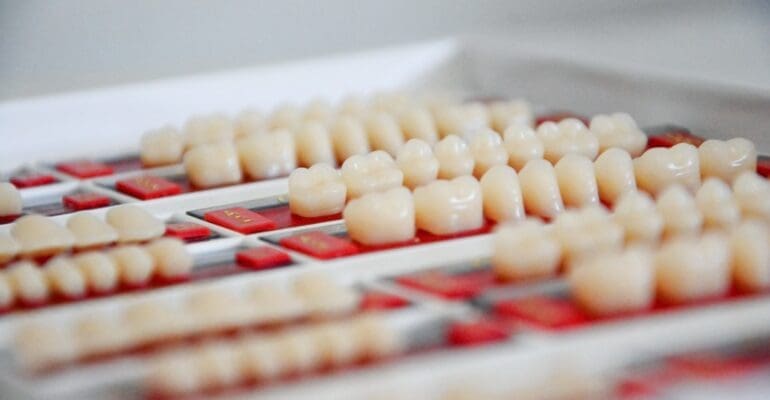Are you considering dental implants as a solution for missing teeth but not sure where to start? Dental implants have become an increasingly popular choice for those looking to restore their smiles and improve overall dental health. At Your Dental Health Partners, we believe in providing our patients with the education and information they need to make well-informed decisions about their dental care. With this in mind, we’ve created The Ultimate Guide to Dental Implants – a comprehensive resource to help you understand everything there is to know about this revolutionary tooth replacement option.
In this guide, we’ll cover a wide range of topics related to dental implants, from understanding their benefits and the procedure itself to post-operative care and maintenance. By the end, you’ll have a deeper understanding of whether dental implants are the right solution for your unique dental needs, and what you can expect throughout the process.
We hope that this ultimate guide to dental implants will answer your questions and provide the clarity you need when considering this life-changing dental solution. We invite you to explore our website and schedule a consultation at one of our convenient Your Dental Health Partners locations in Worcester, Uxbridge, Leominster, Putnam, Framingham, or Winchendon, and begin your journey towards a more confident, healthier smile.
Benefits of Dental Implants
As we dive deeper into the world of dental implants, it’s essential to understand the numerous benefits this innovative dental solution offers. Dental implants are widely acknowledged for their remarkable ability to replicate the function of natural teeth. Here are some of the key advantages to consider:
- Aesthetics: Dental implants are designed to blend seamlessly with your natural teeth, providing a beautiful and realistic appearance. This aesthetic harmony plays a vital role in boosting your self-confidence and enabling you to smile without any hesitation.
- Durability: Dental implants are made from strong, biocompatible materials such as titanium and zirconia. These materials ensure long-lasting strength, enabling your dental implant to withstand daily wear and tear – often lasting a lifetime with proper care.
- Bone Preservation: One of the essential benefits of dental implants is their ability to preserve the jawbone’s integrity. Tooth loss can often lead to deterioration in bone density. Dental implants stimulate the jawbone, much like natural tooth roots, promoting healthy bone growth and minimizing further bone loss.
- Improved Chewing and Speech: Dental implants function just like natural teeth, allowing you to chew and speak without any difficulty. Traditional dentures or bridges might slip and cause discomfort during eating or speaking, whereas dental implants firmly stay in place, ensuring optimal functionality.
Understanding the Dental Implant Procedure
Now that we’ve covered the benefits of dental implants let’s discuss the procedure. The dental implant process can be broken down into a few key stages:
- Consultation and Planning: The first step in the dental implant process is a thorough consultation to determine your eligibility for dental implants. During this meeting, your dentist will assess your oral health and review your medical history. If implants are deemed suitable, your dentist will create a customized treatment plan, which may include imaging and impressions for optimal implant placement.
- Surgical Placement: The next stage involves the surgical placement of the dental implant. Your dentist will administer local anesthesia or sedation to maximize comfort during the procedure. They will carefully position the implant post, made from titanium or another biocompatible material, into the jawbone. The implant post will serve as a sturdy foundation for the replacement tooth.
- Osseointegration: This stage is critical for the success of the dental implant. Over several months, the dental implant post will fuse with your jawbone in a natural process called osseointegration. This time allows your bone to grow around the implant, creating a strong, permanent bond.
- Abutment and Crown Placement: Finally, once osseointegration has occurred, your dentist will attach an abutment, a small connector, to the dental implant post. This abutment will hold your customized dental crown, restoring the tooth’s visible portion. The dental crown will be skillfully crafted to match the shape, size, and color of your surrounding teeth for a natural appearance.
Aftercare and Maintenance of Dental Implants
Dental implant success relies heavily on proper care and maintenance. Here are some tips to ensure the health and longevity of your dental implants:
- Maintain Good Oral Hygiene: Just like natural teeth, dental implants require regular cleaning to prevent build-up of bacteria and plaque. Brush your teeth twice a day using a soft-bristled toothbrush and gently clean around the implant to avoid damaging the gum tissue.
- Floss Regularly: Flossing daily is crucial for maintaining the health of your dental implant, as it helps remove food particles and plaque from between your teeth and gums.
- Regular Dental Check-ups: Visiting your dentist regularly (every six months, or as recommended) ensures that any potential issues are addressed promptly. It also allows your dentist to monitor the health of your dental implant and ensure it’s functioning correctly.
- Avoid Hard or Sticky Foods: While dental implants are incredibly durable, it’s essential to avoid chewing on hard or sticky foods that could damage the prosthetic.
Addressing Common Dental Implant Concerns
Before concluding, let’s debunk a few misconceptions and address some common concerns associated with dental implants:
- Pain and Discomfort: While the dental implant procedure involves surgery, it is performed under anesthesia or sedation, ensuring minimal discomfort. After the procedure, you may experience some minor discomfort, which can be managed with over-the-counter pain relievers.
- High Cost: It is true that dental implants can be expensive. However, considering their long-lasting durability and health benefits, they can be a more cost-effective solution in the long run compared to other tooth replacement options.
Conclusion
Dental implants are a remarkable solution for restoring missing teeth, offering a host of benefits that improve your appearance, dental function, and overall oral health. Being informed and understanding the advantages, procedures, and proper care of dental implants is critical in making the best decision for your unique dental needs.
At Your Dental Health Partners, we’re dedicated to providing the highest quality dental care and guidance in your journey. Schedule a consultation with our experts in restorative and cosmetic dentistry and take the first step towards your new, confident smile.









